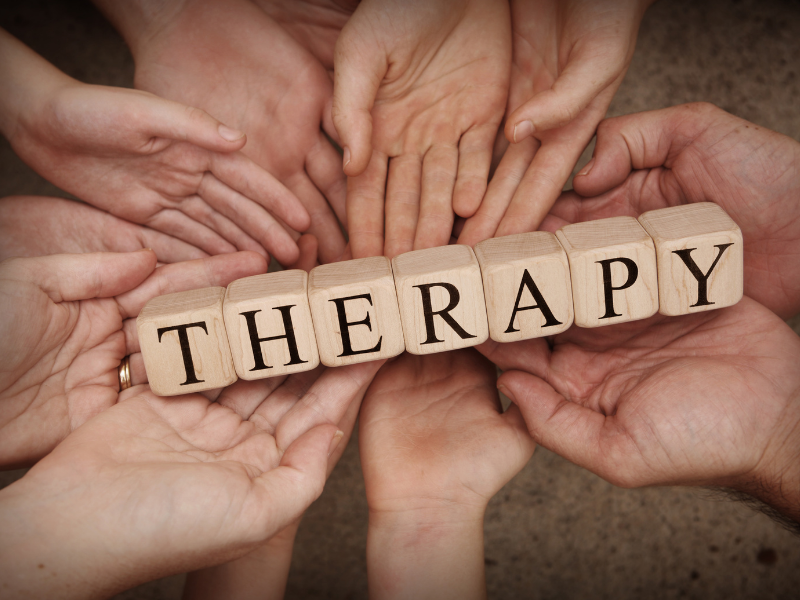Do you know someone you care about who’s having a hard time, and you want to support them but aren’t sure how?
Suggesting they try therapy could be a good way to help them out.
In my country, USA, approximately 50 million individuals, which equates to 21% of adults, are currently experiencing at least one mental illness in the year 2023.
That’s why I’ll go over 10 simple tips that may help you convince a loved one to go and start taking charge of their mental health.
10 Practical Tips on How To Convince Someone To Go To Therapy
#1 Choose A Good Time and Place.
Well, it’s important to pick the right time and place to make it as productive as possible. This could be somewhere away from family gatherings where there won’t be any distractions or deadlines looming.
To talk to someone about their mental health, you have to be both emotionally sensitive and physically sensitive.
Before starting the conversation, make sure to ask if they have time for a chat so that everyone is on the same page.
Consider This :
- Private
- Safe
- Pick Holiday Time
Take some private time to think carefully about the right setting for your conversation. Make sure it’s somewhere comfortable where you can both feel at ease without any pressure or tension lingering from recent arguments.
#2 Make An Offer To Assist With The Logistical Issues
One of the biggest barriers to therapy for many people is logistical issues such as finding a licensed mental health counselor, appointments, transportation, etc.
However, finding a skilled therapist can be a long and confusing process, especially for people who have never done it before. People who are already dealing with worry, anxiety, or depression may find this task especially hard.
Start by asking them what they need and how you can help. Some people may prefer to do it themselves, but others may appreciate the support.
Here are some ways you can offer to help:
- Research therapists in their area who accept their insurance
- Help them make phone calls to schedule appointments
- Drive them to appointments if they’re not comfortable driving themselves
- Offer to attend appointments with them if they need support
- Help them keep track of their appointments and make sure they’re following through with their treatment plan
Of course, you need to be considerate of what your loved ones need and like. Some of them might feel uncomfortable or shy about going to therapy, so you should be gentle and respectful when discussing it.

#3 Explain How Therapy Can Help
I think it’s important to talk to your loved one about therapy and how it can help them.
Therapy can help you figure out and deal with things like feeling anxious, sad, or hurt from past experiences.
Therapy, which is also called talk therapy or psychotherapy, is a powerful treatment that can help anyone with a mental health problem like depression, anxiety, PTSD, or a drug or alcohol addiction.
Most people who refuse therapy may say they don’t have a problem.
Through talk therapy, individuals can learn to cope with their internal and external responses to life events.
The therapy process involves self-exploration, introspection, and reflection, among other suitable approaches, to manage cognitive, behavioral, and emotional responses.
Many people worry about the length of time they will need to attend therapy. However, most therapy approaches, like cognitive-behavioral therapy, have a specific timeframe and session number.
This can alleviate fears about therapy going on for many months.
#4 Show Support and Compassion
To avoid making your loved ones angry, it can help to talk to them lovingly.
Instead of giving help, try asking questions. “What do you think about going to therapy?” can be a great way to start a talk.
But it can be challenging for them to take the first few sessions. They may worry about being judged or treated differently if they seek therapy.
That’s why it’s crucial to approach the topic with love and understanding.
Let them know that they are important to you and that your friendship is valuable.
Offer words of support, like
“I want to make sure you’re healthy and happy” or “I’m here for you when times get tough.”
“You mean so much to me. I want to help you get back on track.”
Make it clear that seeking therapy help is a brave decision and one that you’re proud of them for making.
When people feel like they have your full support and understanding, they’re more likely to consider seeking professional mental health help.

#5 Share Your Own Experience
Basically, by sharing your own story, you can normalize the act of seeking professional help and show that it’s something that other people have done with positive outcomes.
Rather than lecturing someone about the value of therapy, share how it has helped you personally in detail.
You can do this by describing how you felt before starting treatment, what specific techniques or forms of therapy were useful to you, and how much progress you made as a result.
By showing rather than telling, you make the conversation around therapy more approachable, share the mental health issues, and destigmatize the idea of seeking help from a mental health professional.
#6 Suggest Therapy As An Option.
When you have a friend who’s going through a difficult time, it might be worth suggesting therapy as an option.
You can introduce the idea gently, but be direct and to the point. Make sure to use factual language and avoid euphemisms or any implication that therapy is something strange or shameful.
Let them know that therapy is a safe space where they can talk openly about their concerns and receive support in managing them.
To do this, you can describe how working with a professional helps them gain more clarity and perspective on their situation and make decisions from a more informed place.
Here are some examples of how to broach the subject:
- Have you considered seeing a therapist?
- Would you be open to trying talking therapy?
- Do you think speaking to a mental health professional could be helpful?
#7 Know About Common Fears And Misconceptions.
Have you or someone you know ever refused to see a therapist? It’s not uncommon,
According to clinical psychologist Loren Soeiro, Ph.D. Some common reasons people refuse to see a therapist include the following:
- “I don’t have time.”
- “I saw a psychologist once and it didn’t help.”
- “It costs too much.”
- “I’d rather talk to my friends.”
- “What good is talking going to do?”
- “I’d feel weird talking about this stuff to a stranger.”
It’s essential to acknowledge and validate these concerns rather than dismissing them.
If someone you know is hesitant to seek therapy, take the time to address their concerns. Do some research ahead of time so you can provide helpful responses.
For example, if your loved one is worried about confidentiality, explain that all information shared with a therapist is strictly confidential.
And if they’re skeptical about a therapist’s level of care, explain that building a positive relationship with a therapist over time is key to a successful therapeutic experience.
#8 Show You Care
You may have noticed that some people are hesitant to seek mental health support due to social stigma, mental health conditions, and misunderstanding.
It’s important to understand that your loved ones may need help, even if they don’t ask for it directly.
Try to approach the subject with empathy and an open mind.
Listen carefully to what they have to say and avoid using language that could be seen as stigmatizing or dismissive.
#9 Prepare For Resistance
For the next one, be prepared for resistance if you try to encourage your loved one to seek help. Listen to their objections and understand why they feel that way about mental health treatment.
It may take a few conversations to reduce their negative feelings.
Here are some steps to prepare for resistance when trying to encourage a loved one to seek professional mental health support :
Be ready for resistance: Your loved one may need to be more open to the idea of seeking professional help. Prepare yourself for this possibility and try to understand why they feel this way.
Listen to their objections: Take time to hear their objections and try to understand their perspective. It may take a few conversations to reduce their negative feelings.
Don’t be pushy: Try not to be defensive or pushy. You can’t force an adult to talk to you or get help before they’re ready.
Highlight their strengths: Mention what you find admirable in them. Praising them may inspire them to take the required actions to develop themselves even further.
Focus on specific issues: Explain specific instances of problematic conduct without coming across as judgmental. This can assist them in understanding the necessity of obtaining professional help.
#10 For Couples Therapy, Take The Carrot-and-stick Approach.
Couples therapy can offer a fresh start.
To approach it, according to expert Woodsfellow encourages partners to use “I” statements instead of “you” statements; identify the problem, and explain how your relationship would benefit from therapy.
The carrot-and-stick method is an effective way of doing this – offering rewards and potential consequences.
With the ‘carrot’, you could tell your partner that if you change the way you fight, it would make you feel calmer, happier, and more connected.
By contrast, with the ‘stick’, let them know what could be lost if you don’t get help – feeling discouraged, distant, maybe even hopeless – and even the possibility of breaking up.
Well, this is not a threat but an honest expression of your understanding and commitment to making things better in your relationship.
Must Read: 23 Signs You Grew Up With Ehlers-Danlos Syndrome

Signs That Someone May Need Treatment
It’s not always easy to tell when someone needs mental health treatment, but some signs can help. If any of the following apply, it’s time to seek help for the person you care about:
Here are some signs to look out for:
• Problematic Behavior
Your loved one may be making unsafe choices, crying more frequently than usual, showing an increase in substance abuse, losing interest in activities they used to enjoy, and withdrawing from family and friends.
• Sleep Changes
They might have difficulty getting out of bed each day, have unusual sleep patterns, and have insomnia.
• Cognitive Difficulties
Trouble concentrating on conversations or activities, disorientation, seeing or hearing things no one else does, and forgetting important facts.
• Poor Self-Care Habits
A change in their hygiene routine, like not brushing their teeth or showering as often, can be a sign.
•Social withdrawal
Many people feel better when they have at least some time to themselves. Shyer people may need more time alone than others. However, therapy can help you understand and deal with feelings of stress or fear when you’re around other people.
• Uncontrollable Mood Swings
Sudden changes in emotions without any warning signs could point to the need for professional treatment.
Also, Check Out This Article : Aphantasia Test
Final Thoughts
To wrap up, helping a loved one who might need professional help with their mental health is an act of love and kindness.
There is still a large portion of people who are not receiving the help they need, which can have major consequences if left untreated. So prioritize the therapy for your beloved person.





